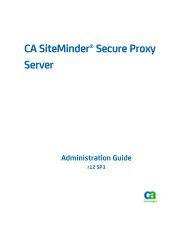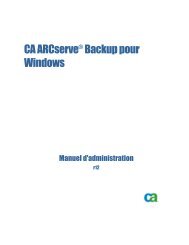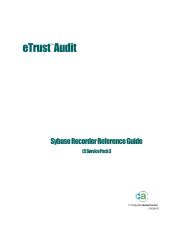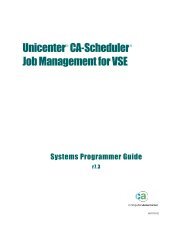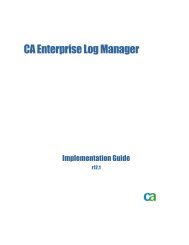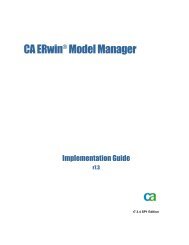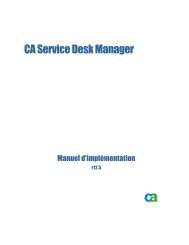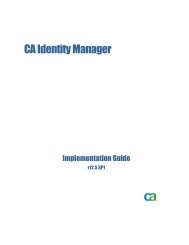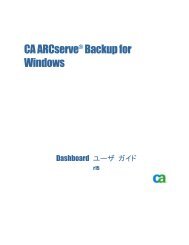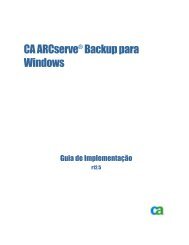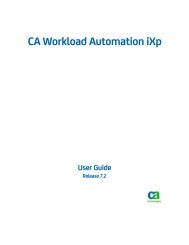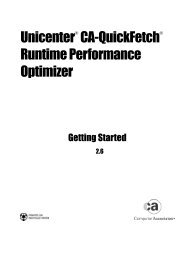Unicenter CA-Scheduler Job Management for VSE User Guide
Unicenter CA-Scheduler Job Management for VSE User Guide
Unicenter CA-Scheduler Job Management for VSE User Guide
You also want an ePaper? Increase the reach of your titles
YUMPU automatically turns print PDFs into web optimized ePapers that Google loves.
7.2 Backlogged Work<br />
7.2 Backlogged Work<br />
There will be times when schedules or jobs will not complete the day on which<br />
they were selected which means that they may be candidates <strong>for</strong> being<br />
backlogged, but first, define what a day is.<br />
In terms of your company, a day would be your normal daily business<br />
computer cycle. For example, production work starts at 16:00 and is to be<br />
completed by 08:00 the next morning. This is fairly typical which means you<br />
run autoscan at, or shortly after, 08:00 (to select schedules and jobs <strong>for</strong> the next<br />
16:00 to 08:00 time period). Thus, in terms of <strong>Unicenter</strong> <strong>CA</strong>-<strong>Scheduler</strong>, a day is<br />
the 24-hour period that starts with the time that you run autoscan. This is<br />
termed the production day or autoscan day.<br />
Schedules and jobs that do not complete on the production day on which they<br />
were selected can be carried over to the next production day. They are then<br />
called backlogged schedules or jobs. When you define a schedule or job to the<br />
database, specify whether that schedule or job is a candidate <strong>for</strong> backlog.<br />
Normally it is.<br />
What happens if the work <strong>for</strong> a production day is not complete is next<br />
described.<br />
<strong>Job</strong> Backlog<br />
The normal situation allows schedules to be backlogged.<br />
When autoscan is initiated and it is determined that a<br />
schedule is still active (it has not finished running yet),<br />
the schedule will be backlogged. Any job in the schedule<br />
that has completed, been canceled, or purged will retain<br />
its status. If a job has been defined with<br />
BACKLOG=YES, it will be backlogged if it had not<br />
started. That is, it will be allowed to run. If a job in the<br />
backlogged schedule has been defined with<br />
BACKLOG=NO and still has a status of WAITING, it<br />
will be canceled with a status called NO BACKLOG<br />
CNCL.<br />
Once all jobs in the backlogged schedule have been<br />
completed or canceled, the schedule will be marked as<br />
complete. If the same schedule was also selected on the<br />
current production day, then it and its associated jobs<br />
will be placed on the <strong>Unicenter</strong> <strong>CA</strong>-<strong>Scheduler</strong> tracking<br />
file and processed as if it had been selected normally.<br />
If a daily schedule gets backlogged <strong>for</strong> greater than 24<br />
hours (that is, it is backlogged by two autoscans), then<br />
when it completes, the schedule to execute on the<br />
completed day is loaded to the tracking file. For<br />
example, if Monday's schedule gets backlogged and<br />
7-8 <strong>Unicenter</strong> <strong>CA</strong>-<strong>Scheduler</strong> <strong>User</strong> <strong>Guide</strong>



